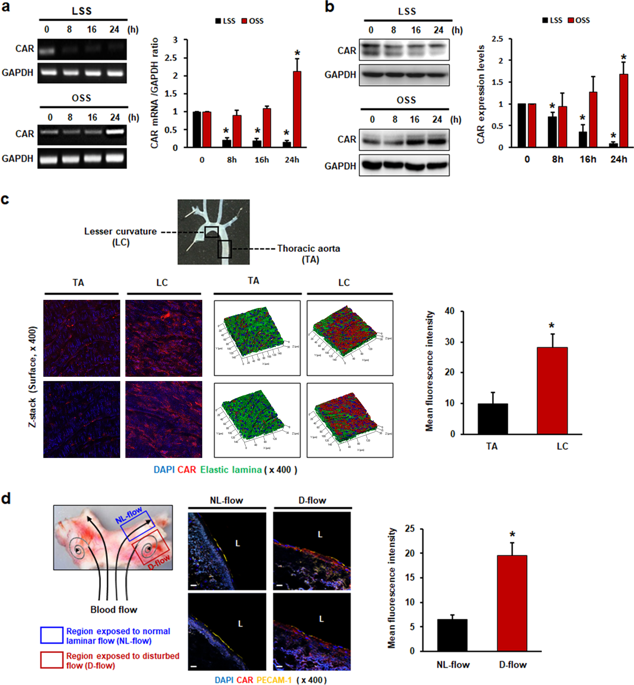Experimental & Molecular Medicine ( IF 9.5 ) Pub Date : 2019-11-27 , DOI: 10.1038/s12276-019-0347-7 Jihwa Chung 1 , Kyoung Hwa Kim 1 , Shung Hyun An 1 , Sunmi Lee 2 , Byung-Kwan Lim 3 , Sang Won Kang 2 , Kihwan Kwon 1, 4

|
Endothelial mechanotransduction by fluid shear stress (FSS) modulates endothelial function and vascular pathophysiology through mechanosensors on the cell membrane. The coxsackievirus and adenovirus receptor (CAR) is not only a viral receptor but also a component of tight junctions and plays an important role in tissue homeostasis. Here, we demonstrate the expression, regulatory mechanism, and role of CAR in vascular endothelial cells (ECs) under FSS conditions. Disturbed flow increased, whereas unidirectional laminar shear stress (LSS) decreased, CAR expression in ECs through the Krüppel-like factor 2 (KLF2)/activator protein 1 (AP-1) axis. Deletion of CAR reduced the expression of proinflammatory genes and endothelial inflammation induced by disturbed flow via the suppression of NF-κB activation. Consistently, disturbed flow-induced atherosclerosis was reduced in EC-specific CAR KO mice. CAR was found to be involved in endothelial mechanotransduction through the regulation of platelet endothelial cell adhesion molecule 1 (PECAM-1) phosphorylation. Our results demonstrate that endothelial CAR is regulated by FSS and that this regulated CAR acts as an important modulator of endothelial mechanotransduction by FSS.
中文翻译:

柯萨奇病毒和腺病毒受体介导内皮细胞对流体剪切应力的反应。
流体剪切应力 (FSS) 的内皮机械传导通过细胞膜上的机械传感器调节内皮功能和血管病理生理学。柯萨奇病毒和腺病毒受体(CAR)不仅是病毒受体,也是紧密连接的组成部分,在组织稳态中起重要作用。在这里,我们展示了 CAR 在 FSS 条件下在血管内皮细胞 (ECs) 中的表达、调控机制和作用。扰动流动增加,而单向层流剪切应力 (LSS) 降低,CAR 通过 Krüppel 样因子 2 (KLF2)/激活蛋白 1 (AP-1) 轴在 EC 中表达。CAR的缺失通过抑制NF-κB活化降低了由流动障碍引起的促炎基因和内皮炎症的表达。始终如一,在 EC 特异性 CAR KO 小鼠中,干扰流诱导的动脉粥样硬化减少。发现 CAR 通过调节血小板内皮细胞粘附分子 1 (PECAM-1) 磷酸化参与内皮机械转导。我们的研究结果表明,内皮 CAR 受 FSS 调节,并且这种受调节的 CAR 是 FSS 内皮机械转导的重要调节剂。









































 京公网安备 11010802027423号
京公网安备 11010802027423号